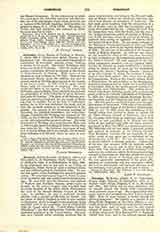

Corcoran, MICHAEL, soldier, b. at Carrowkeel, County Sligo, Ireland, September 21, 1827; d. at Fairfax Court House, Virginia, U.S.A., December 22, 1863. His father was an army pensioner, and he himself joined the Royal Irish Constabulary when nineteen years of age. He resigned after three years’ service and emigrated to New York in August, 1849. Here he soon became a leader among his fellow-countrymen. He enlisted as a private in the Sixty-Ninth Regiment of the State Militia, a command composed of Catholics of Irish birth or descent, and rose from rank to rank until he was elected colonel, August 25, 1859. The next year the Prince of Wales (afterwards King Edward VII of England) visited New York, and in the military parade given in his honor Colonel Corcoran refused to order the Sixty-Ninth Regiment to join. For this act of military disobedience he was placed under arrest by the State authorities and ordered before a court martial. The trial created much excitement all over the country, his Irish countrymen enthusiastically applauding his course, and the case was pending when the Civil War broke out. The proceedings were immediately quashed, and the Sixty-Ninth, with overflowing ranks, was one of the first regiments to march, with Corcoran at its head, April 23, 1861, to the defense of the Union. It participated with special gallantry in the first Battle of Bull Run, July 21, 1861, in which action Colonel Corcoran was wounded and taken prisoner. He was kept in the Confederate prisons for thirteen months and then exchanged in August, 1862. His return to the North brought him a series of popular ovations and testimonials. He was commissioned a brigadier-general, at once raised a brigade of four regiments, which was called the Irish Legion, and, taking command of it, rejoined the army in Virginia in November, 1862. During the following year the Legion participated in several minor engagements, and while in camp at Fairfax Court House, Virginia, General Corcoran was thrown from his horse and died the same day from the effects of the accident.
THOMAS F. MEEHAN

